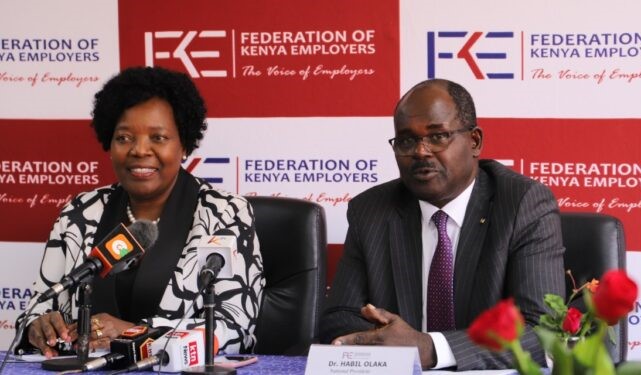Employers union raises red flag over high cost of doing business, says most firms face closure

By Dennis Tarus |
FKE said the cost of doing business in the country has become unsustainable since the enactment and implementation of the Finance Act 2023.
The Federation of Kenya Employees (FKE) has sounded an alarm over the country's high cost of living and the cost of doing business in the country.
FKE said the cost of doing business in the country has become unsustainable since the enactment and implementation of the Finance Act 2023.
"The employers' view is that the changes have had an overall negative impact on cash flows and the financial positions of enterprises in several ways," FKE said in a statement on Friday signed by their President Habil Olaka and CEO Jacqueline Mugo.
FKE said the changes have had a direct impact on the payroll and demand on the general wages review as well as contributed to the risk of business closure and increased the lay-offs of employees.
The employers' union also cited the weakened shilling which it said has adversely affected businesses that rely on imports which include machinery and equipment necessary for manufacturing industries.
"The Kenya shilling lost 21 per cent of its value between September and November this year. The exchange rate of the Kenya Shilling against the USD has hit a high of 152.45 compared to 121.05 at the same time in 2022. This has largely contributed to the capital flight and reduced inflow of foreign currency due to the low value of exports," FKE warned.
FKE further warned the country is still reeling from the negative impacts of Covid-19 saying that between October 2022 and November 2023, Kenya had three per cent (70,000) of the jobs in the formal private sector. and 40 per cent of employers have reported they are planning to reduce their number of employees to meet the increasing costs of operating in the country.
Cost of capital
The employers said the cost of capital in the country remains high making it hard for the private sector to operate citing the overall year-on-year inflation rate as measured by the Consumer Price Index (CPI) was 6.9 per cent last month.
FKE urged the government to put in place measures that improve the purchasing power of citizens and the cash flow in enterprises.
"The key taxes that need to be reviewed are the VAT of petrol, PAYE and Corporate Tax. We propose that the VAT on petrol revert to 8 per cent as it was before the enactment of the Finance Act 2023. The increase in VAT on petrol has a regressive effect on the economy," FKE said.
The employers' union also appealed to policymakers to consider reducing PAYE to a maximum of 25 per cent.
"This is because food inflation remains the highest contributor to the cost of living. Our desire is for corporation tax to be reverted to 25 per cent. This will help in attracting investment and allowing the corporates to have money to plough back into their businesses to create more employment," FKE said.
FKE also wants the Affordable Housing Levy to be capped at Sh5,000 per month as it was originally proposed.
"Businesses are closing down, and we are seeing employees increasingly becoming working poor," FKE said.
FKE further warned of social unrest if the high cost of living is not addressed which will cripple enterprises.
"The current cost of living coupled with recent additional taxes on the employees has resulted in shrinking payslips. This kind of environment compels workers to seek alternative sources of income, leading to low productivity," FKE said.
FKE cited Kenya's Kenya's low productivity which it said was lower compared to its East African neighbours of Tanzania and Uganda.
"Labour productivity grew by 8.4 per cent and 13 per cent respectively in Tanzania and Uganda while that of Kenya stands at 6.77 per cent," it said.

















